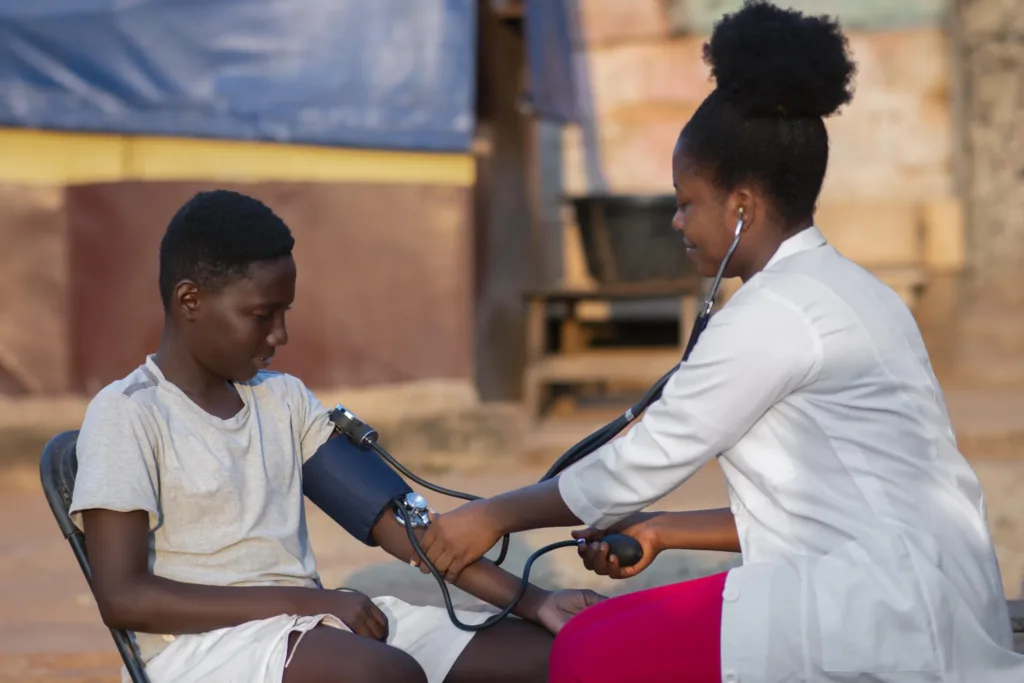1 year ago, we published The Lancet Nigeria Commission: investing in health and the future of the nation, which carefully laid out how investing in health would enable Nigeria to fulfil its immense potential and power—in the region, the continent, and on the world stage. The report was led by Professor Ibrahim Abubakar (UCL, London) and written by Nigerians, for Nigerians. The Commission called for health to be placed at the centre of a new social contract, to energise engagement in society, to generate wealth, and ultimately to help inspire a new generation of Nigerians, as the country becomes one of the most populous nations in the world. The Commission’s recommendations also included measures to improve prevention of ill-health and health system reform to achieve universal health coverage through innovative financing and the establishment of a National Medical Research Council. Nigeria is now in the midst of a series of contested elections. What will they mean for the Commission’s vision?
Last month’s presidential election saw Bola Tinubu elected to replace the outgoing President Muhammadu Buhari. Tinubu’s manifesto is often light on specifics, but he has promised to address health infrastructure, overworked health-care staff, Nigeria’s high maternal and infant mortality, improving preventive care, and localising vaccine production. He has made pledges to improve access to primary care and is pushing for universal health coverage. However, the election had a record low turnout and the result has been contested by opposition candidates, who are critical of the electronic processes including registration, counting, and final vote numbers. With Tinubu due to be sworn in on May 29, the situation remains fluid. Similarly, state level election results are still being scrutinised, amid reports of problems with digital voting and allegations of corruption. The 36 state governorships in question have extensive power over health, with half of Nigeria’s health budget—including most of the primary care funding—held at governor level.
Tinubu inherits a series of initiatives on health that were started by Buhari. The most important of these is Nigeria’s National Health Insurance Authority Bill, that President Buhari ratified in May, 2022, and which makes health insurance mandatory for all citizens of Nigeria. This provision was a key recommendation of the Lancet Nigeria Commission and is intended to support the most vulnerable populations including the poorest, children younger than 5 years, pregnant women, and older people. The previous patchy system led to only 3% of Nigerians having insurance coverage by 2018. Tinubu has promised to increase coverage to 40% by 2025. Additionally, in January, 2023, President Buhari signed the National Mental Health Act 2021, providing a much-needed replacement to outdated and stigmatising care across the country. Both Tinubu and Buhari are from the All Progressives Congress party and, as a continuity candidate, Tinubu will hopefully see these initiatives as health priorities.
However, there are other challenges to seeing these reforms through. Ensuring that all Nigerians can access quality health services will require structural reform to enable local delivery, as well as large amounts of investment. Corruption in the health system is also a concern. It can affect the health of any nation through misdirection of funds, limiting access to care, influencing chains of procurement, and driving brain drain. According to Transparency International, Nigeria ranks at 150 of 180 countries in terms of public sector corruption, and its most recent data report shows that 44% of public service users paid a bribe in the previous 12 months.
Nigeria has great strengths. Its global health leadership, both locally and through the diaspora, is peerless, having a key role in sharing health knowledge and capacity. Nigeria is at the vanguard of the technology industry, which could also be better applied to further health care. Furthermore, as the Commission highlighted, Nigeria has tremendous potential from its burgeoning youth—engaging that demographic dividend would bring great benefits to the country and the world. In a recent blog written in light of the election controversy, Michelle Gavin, of the Council on Foreign Relations, has warned how voters’, especially first-time voters, trust in Nigeria’s democracy could be diminished. Such a shift jeopardises any chances of forging a new social contract between state and citizens, which are needed to realise the country’s potential. But investing in health can be a means of bolstering public trust in the state. The new Government must fulfil the hopes and aspirations of its own people—as expressed in The Lancet Commission by Nigerians themselves—to put health at the top of its agenda.
The views expressed in this article are the author’s own and do not necessarily reflect Lafiya360’s editorial stance.


